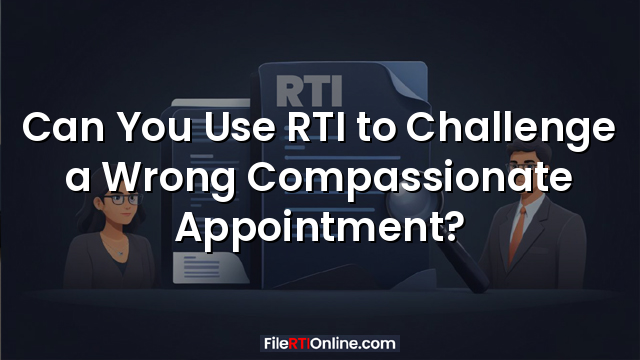Compassionate appointments are meant to support the family members of a deceased employee quick employment to the next of kin. However, allegations of misuse or wrongful appointments are not uncommon. Many citizens try to use the Right to Information (RTI) Act to uncover irregularities in such appointments.
A recent Central Information Commission (CIC) case involving Eastern Coalfields Limited (ECL) clarifies what information can and cannot be obtained through RTI in such situations.
Background of the Case
The appellant filed an RTI application seeking complete details regarding a compassionate appointment of one Shri Abdul Rehman, whom the appellant alleged was an imposter. According to the appellant, the real dependent (the deceased employee’s son) was denied compassionate appointment due to under-age, but another person with the same name was appointed and later passed away.
The Public Information Officer (PIO) refused disclosure on two main grounds:
1. Section 8(1)(j) – Third Party Personal Information
The appointment documents and personal details belonged to a third party and were therefore exempt from disclosure.
2. Remaining Queries Were Not “Information”
Allegations, explanations, or inquiries into wrongdoing do not fall within the definition of “information” under Section 2(f) of the RTI Act.
Key Points Raised During the CIC Hearing
During the hearing:
· The PIO repeated that personal records of another individual are protected under Section 8(1)(j) and cannot be disclosed unless larger public interest is proven.
· The appellant insisted that a wrongful appointment had taken place and that RTI should help uncover the irregularity.
· The PIO clarified that RTI cannot be used to investigate allegations or verify claims.
· The appellant claimed that the rightful dependent was overlooked and that ECL had not responded to his earlier representations.
The core issue revolved around whether alleged procedural irregularities could be examined through RTI.
CIC’s Final Decision
The CIC delivered a balanced order addressing both transparency and privacy considerations.
1. RTI Cannot Be Used as an Investigative Tool
The CIC held that allegations of impersonation, procedural lapses, or corruption must be raised before the relevant administrative authority, not through RTI.
RTI is meant to access existing records—not to establish facts, conduct inquiries, or investigate wrongdoing.
2. However, Appointment Records Must Be Shared
While personal information is protected under Section 8(1)(j), the Commission found that appointment records of a deceased employee have significantly reduced privacy concerns.
Therefore, the CIC directed the PIO to:
· Provide all appointment papers, records, and documents relating to the person appointed on compassionate grounds who has since expired.
This ensures basic transparency without violating privacy of living individuals.
3. Larger Issue Should Be Taken to Competent Authority
The Commission advised the appellant to approach the:
· Personnel Department
· Vigilance Wing
· or any other competent authority within ECL
for inquiry or correction if procedural irregularities had indeed occurred.
What This Means for RTI Applicants
This case provides important clarity on using RTI in matters relating to compassionate appointments.
You Can Use RTI For:
· Obtaining copies of appointment letters and records (especially if the appointed person is deceased).
· Accessing rules, guidelines, and procedures relating to compassionate appointments.
· Gathering factual, existing documents.
You Cannot Use RTI For:
· Investigating allegations.
· Asking the PIO to confirm whether fraud occurred.
· Seeking explanations, clarifications, or opinions.
· Demanding comparisons between two individuals’ eligibility.
RTI is a document-based transparency tool—not a grievance redressal or investigation mechanism.
How to Raise Issues of Wrong Appointment
If you suspect misuse of compassionate appointment, take these steps:
1. File a written complaint to the appointing authority.
2. Attach supporting documents obtained through RTI.
3. Escalate to senior officials if ignored.
4. Approach the Vigilance Department with evidence.
5. If required, file a complaint before the appropriate tribunal or court.


